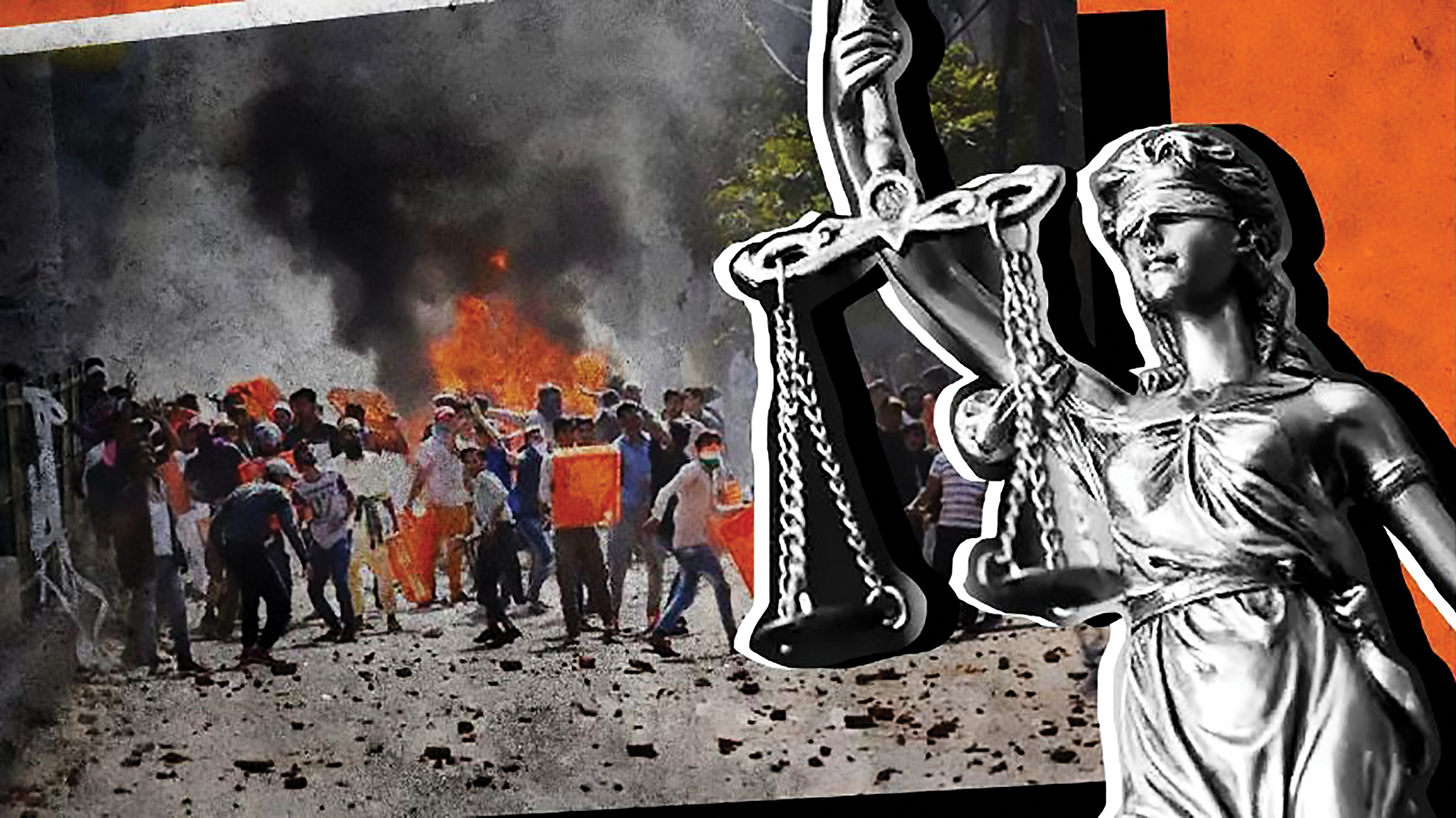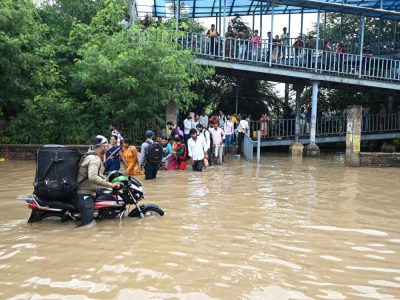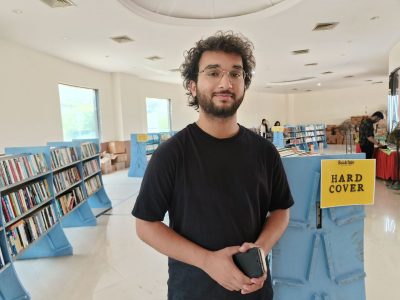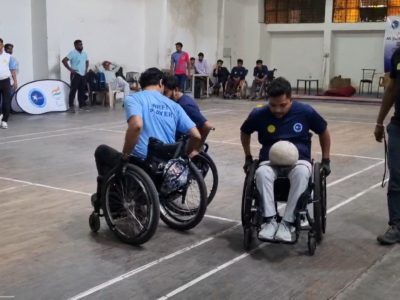The Supreme Court and Delhi High Court both heard matters on the law and order situation in the city, but their different opinions resulted in different outcomes on the same situation
FOUR DAYS after violence in Delhi left at least 34 dead and hundreds injured, two constitutional courts heard two matters in the case on Wednesday. Both the Supreme Court and the Delhi High Court differed in their opinions, resulting in differing outcomes to the same situation.
In the high court, Sneha Mukherjee, Fazal Abdali and Nabeela Hasan of the Human Rights Law Network had filed a plea on behalf of activist Harsh Mander who sought registration of FIRs against those Bharatiya Janata Party leaders who made speeches triggering the communal violence. Seeking an urgent hearing, the Delhi High Court had posted the matter for consideration today.
At the same time, Bhim Army chief Chandrashekhar Azad, former central information commissioner Wajahat Habibullah, and a Shaheen Bagh resident, Bahadur Abbas Naqvi, approached the Supreme Court, seeking relief and the registration of FIR against those indulging in violence.
Both the constitutional courts heard the matter this morning. The Supreme Court adjourned the issue till March 23, while the high court directed the presence of a senior police official and posted the matter for hearing for later in the day.
Proceedings in the high court
The high court’s directions came on a plea filed by Harsh Mander who sought an FIR against BJP leaders Kapil Mishra, Anurag Thakur, and Parvesh Sahib Singh in connection with the ongoing violence in the city.
The division bench comprised Justices S Muralidhar and Talwant Singh. The court asked the Delhi police when deemed it to be appropriate to take action against those who inciting violence through hate speeches.
Holding the Delhi police accountable for the riots, the court expressed its “constitutional anguish” and asked why no cognisance and subsequent action was taken against those who allegedly tried to whip communal frenzy through their speeches as early as December 2019.
Saying Delhi has seen enough violence, the division bench directed police officials to take a “conscious decision” on the registration of FIRs against political leaders who made “inflammatory” speeches that allegedly incited hate.
Special commissioner Parveer Ranjan, who was present in court, was directed to sit with Amulya Patnaik, commissioner of police, and view “every video which is inflammatory”.
Inaction in the Supreme Court
“Unfortunate things have happened,” Justice Sanjay Kisan Kaul said, commenting on the present situation in the national capital. The Supreme Court expressed its concern over a report submitted by the three interlocutors that it had appointed to mediate with protestors in Shaheen Bagh.
“Too many ifs and buts in the report,” the court noted.
In a veiled criticism, Justice KM Joseph, who was also on the bench, said there was a “lack of independence in the professionalism on part of the police”.
Solicitor General Tushar Mehta, representing the Centre, opposed the judge’s observations and advised him not to make adverse comments that would demoralise the Delhi police.
Justice Joseph replied: “If I don’t do that, I wouldn’t be loyal to the institution. All these things (violence) would not happen if the police had acted strictly as per law.”
Mehta said, “Your lordship may not know that our constable has died. Let’s not demoralise the police.”
Justice Joseph referenced the police in the UK, saying security forces there would have sprung into action as soon as they saw something happening. “They don’t need anybody’s nod.”
He added that there’s “nothing political” about this. “Don’t misunderstand me, but there are long term implications to this…This (violence) would not happen if the people are allowed to get away.”
In the context of events unfolding in Delhi, the judge said: “All stakeholders should lower their temperature and blood pressure. This is not how a society should behave…Unfortunately, the debate is degenerating into something else, this is not healthy dissent.”
Senior advocate Colin Gonsalves appraised the bench that the high court had already taken cognizance of the issue and was slated to hear the matter at 12.30 pm. Acknowledging this development, the Supreme Court adjourned the matter to March 23 observing that the present “environment is not conducive” to discuss these issues.
BACK IN THE HIGH COURT
Two kilometres away, the matter came before the judges of the Delhi High Court.
The matter was initially listed before Chief Justice DN Patel. However, since he was absent and the bench led by the second senior-most judge, Justice GS Sistani, did not assemble, Gonsalves mentioned the matter before Justice S Muralidhar. who is presently third in seniority at the high court.
Taking note of the urgency of the issue, Justice Muralidhar agreed to hear the matter at 12.30 pm and directed the presence of senior police officials in court.
“This is so important that everything can wait,” he said.
Tushar Mehta sought the matter to be adjourned by a day on the grounds that he would need time to reply. However, the court said: “We must answer Rahul Mehra’s concern first because the Centre is not a party.”
But Mehta repeatedly sought the court’s indulgence in adjourning the matter till tomorrow. Referring to Harsh Mander’s first prayer, where he sought an FIR against the three BJP leaders Anurag Thakur, Kapil Mishra, Mehta wondered what was the urgency when one of the speeches was first made as far back as December 2019.
“If we waited this long, why can’t we wait another 16 hours?” he said. “It’s a petty issue… law and order is the responsibility of the Centre. I am making an oral request to implead the Union of India as a party and allow me to file a response.”
Justice Muralidhar stood firm. “I want you to address us as an officer of the court, a constitutional authority.”
Cornered, Mehta replied: “What are the facts, I am not aware. It can wait till tomorrow. I leave it to your lordships.” Mehta insisted that he could not answer without all facts. “Need to know facts before I say anything. As per prayer, it can wait till tomorrow.”
Justice Muralidhar said: “As officer of court, permit us to ask us another question. Frankly, even before we consider anything, asking you as a law officer, answer us this. Have you seen the video referred to in Prayer 1? There are three video clips which thousands have watched.”
He was referring to a video of Kapil Mishra, where Kapil Mishra convened a rally in the tense Maujpur-Jaffarabad area of North East Delhi and demanded that the police remove citizenship law protesters in three days. Kapil Mishra has been blamed for triggering the violence since then.
In response, Mehta informed the court that he did not usually watch TV or the news and thus had not seen any of the videos that were being referred to.
The judge said, “Let’s ask the police officer if they have watched the clips. Let’s find out. Maybe he has also not watched it. We had asked a senior police officer to attend the hearing today. Where is he? Ask him to come forward.”
He then asked the police officer if he had watched the three clips. The officer said no to one, yes to two — he hadn’t seen the video featuring Mishra. At this, the courtroom laughed again. The judge objected to the laughter and asked for decorum, saying the hearing would otherwise continue in camera.
Justice Muralidhar then expressed his astonishment. “Are you saying that even the commissioner of police has not seen the video related to one (Kapil Mishra’s speech)? This is too serious a matter. I am amazed at the state of affairs of the Delhi police. Let’s play it so that Mr Mehta can also watch it for the first time.”
Addressing Mehta, he continued: “I am quite relieved you are here. You will be able to help us now. This is the best possible assistance we can have. We are specifically showing you the clip since you have never seen it.”
Saying this was the clip leading to the prayer, the judge paused and the court staff played the clip on a computer.
Once it was done, the judge pointed to a DCP standing beside Kapil Mishra in Sunday’s clip and asked who he was. “He is DCP North East Surya,” came the response. Mishra was then given a transcript of the video clip that had just been played.
The bench then addressed Mehta. “Now that you have watched it, you as a law officer, advise the commissioner of police so that we don’t have to pass any order. You are the Solicitor General of India.”
Mehta said: “The question as to whether to file FIR and when to file it, grant us time to take a call at an appropriate stage. Any discussion that will aggravate the situation should wait. I have spoken to the highest authorities, we might end up further aggravating the situation. As an officer of law, I suggest we wait.”
“That’s your stand?” the court asked.
Rahul Mehra interjected: “I see no reason why the FIR cannot be filed. It can be quashed later, if no evidence is found. The videos have led to the situation of Delhi burning today. If we don’t find any evidence as per law, we are entitled to file cancellation report. This is our stand.”
Mehta said insistently: “The Centre moves an application seeking to implead itself. Kindly allow and give time. It should wait, it can wait.”
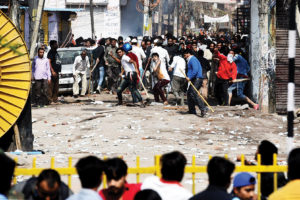
Gonsalves, who was representing Mander, said, “This is one of the most extreme cases. It is shocking to hear that we should wait. Instead need to act immediately against those who uttered the slogans. The slogans have not just incited terror. It has been followed by gangs of this leader who took a procession in colonies where houses are ablaze.”
Gonsalves continued, “The leaders went back to the gangs…you can see them marching, saying slogans to beat them (the minorities) and to shoot them. We have yesterday’s video, where a recently elected MLA [made an] inflammatory speech. After seeing the videos, there is no doubt.”
Justice Muralidhar said, “Have you seen the videos? If not, can we show them?”
Gonsalves said, “The speech by Anurag Thakur set the ball rolling. His slogan has become one of the most repeated slogans if not in Delhi, but the country.”
“Were there police personnel present there?” the judge asked.
The clip of Anurag Thakur saying “desh ke gadaaro ko, goli maro saalo ko” was played in the courtroom.
Gonsalves said, “Yesterday, Abhay Verma said ‘Desh ke hatiyaaro ko, goli maaro saalo ko’. The speech was made in Laxmi Nagar yesterday. The area was peaceful but violence there began after this.” He added: “The leaders are exhorting the people.”
During the course of the hearing, Gonsalves submitted and referred to speeches made by Parvesh Verma and Kapil Mishra.
Continuing his submission, Gonsalves said: “The issue starts with (IPC section) 153A (promoting enmity between religious groups) and ends at Section 302 (murder) of the IPC. Because this (speech) has what led to the deaths of the people. Sections 295 and 295a are applicable since a mosque has been burnt.”
Justice Muralidhar said, “Prima facie, there is a case according to the verdict in Lalita Kumari. Has any of these persons denied these clips?” Justice Muralidhar asked. He was referring to the landmark Supreme Court verdict by a constitutional bench which mandated the registration of an FIR if the information received by a police official did not disclose a cognisable offence but indicated the requirement for a further inquiry.
No, they have not denied these statements, Gonsalves responded. “In fact, they are proud of what they’ve done. They have taken pride in these slogans,” he told the court. “Putting them in jail will be the first step in calming the situation down. The only thing that will do fully justice now is if they are penalised.”
The bench then considered the submissions and ruled that, for now, it would only focus on the first prayer — the registration of an FIR against those who made “inflammatory speeches”.
At this point, advocate Adit Pujari informed the court that the Rouse Avenue District Court had already seized the matter pertaining to Anurag Thakur and Parvesh Verma. Reading out the status report submitted by the police, Pujari said the magistrate had reserved its verdict this morning.
“You are a constitutional court. Please don’t hold back even for a minute,” Gonsalves said. “There has to be speed. And tonight is going to be a very dangerous night.”
Mehta said: “Why sensationalise the issue? As an officer of court, let’s not sensationalise an unfortunate event. This is a delicate situation, and the police is handling it. They (the police) are dying in the line of duty… My request: today is not the day or the correct time. Why [has] his public spirit arisen only with respect to three speeches? When we have 50 other speeches on record.”
To this, Justice Muralidhar said: “You mean you did not take cognisance on 50 other speeches. We are taking your word on face value. That all those other clips have cognisable offence.”
The bench said, “You are putting the police in a worse situation. The police failed to take action. It’s alarming for us that the police have other clips and yet the police is not registering an FIR. What is the appropriate stage, when the entire city burns?”
The court said, “The constitutional court cannot be blind. Duty to protect the lives of citizens. This is a crucial aspect of the entire matter. When is the appropriate time, which is inflammatory according to you, for action to be taken? Do more lives have to be lost? Constitutional court’s anguish must be taken seriously.”
The high court then pulled up the police and took it to task.
To special commissioner Parveer Ranjan, the court said: “This is the consequences of not filing an FIR,” Justice Muralidhar said. “What concerns us is that the same slogan was repeated. The point is this: if you don’t register a FIR, the wrong message goes out and it does not deter people from making such statements. This leads to vast ramifications.”
The police responded that it did not have time to examine the videos since they have been out on the streets since Sunday. “Eleven FIRs registered in terms of looting and arson.”
The court said, “You as police acknowledge that a crime has happened. Registration of FIR is acknowledgement of a crime. All they (petitioners) are asking is why FIR not filed.”
It said, “Why aren’t you showing the same alacrity while filing FIR on the speeches? This is not anger of the court, this is anguish of a constitutional court. That communication has not had the effect it was supposed to, maybe now it will. Here, let me tell you, we will not confine ourselves to these clips. We will look at all the clips. Whosoever they may be.”
The bench added, “We do not want a repeat of 1984. This city has seen enough, anger, anguish and suffered enough.”
At this point, Mehta interjected that the “city is not burning. Only certain areas.”
The Delhi police was directed to inform the court on its decision on other inflammatory clips.
The matter came up next day on 27 February before a different bench headed by Chief Justice of Delhi High Court D N Patel. The Delhi Police did not make any decision on FIRs against hate speech. The matter will now come up for hearing on 13 April.
www.newslaundry.com

